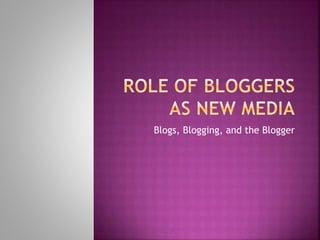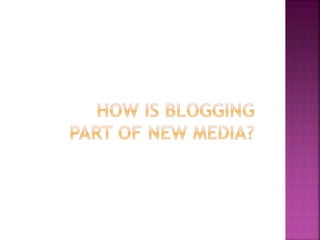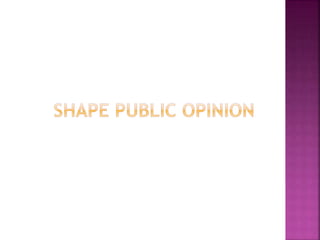The Role of Bloggers as New Media
- 1. Blogs, Blogging, and the Blogger
- 3. forms of communicating in the digital world new methods of communicating in the digital world that allow individuals or smaller groups of people to congregate online and share, sell and swap goods and information allows more people to have a voice in their community and in the world in general Source: PCMag.com (http://www.pcmag.com/encyclopedia_term /0,2542,t=new+media&i=47936,00.asp)
- 4. Streaming video, streaming audio, and live internet broadcasting Highly interactive user interfaces (possibly including mere hypertext or not) Any kind of communication requiring high- bandwidth CD and DVD media Online communities One-to-many visual communications Source: Seach SOA (http://searchsoa.techtarget.com/sDefinitio n/0,,sid26_gci213507,00.html)
- 5. Coined in 1997 (n) WebLog (n) Web site that contains dated text entries in reverse chronological order about a topic (most recent entry first) (v) To write a blog entry Source: PCMag.com (http://www.pcmag.com/encyclopedia_term /0,2542,t=blog&i=38771,00.asp)
- 6. “Once a raft of small projects started by a few pioneering individuals, it has grown into a massive communication tool used by casual hobbyists and media behemoths alike. Blogs have evolved so much that the word has all but lost its meaning, serving as a catchall for nearly any online communication.” - Dan Fletcher, Time Magazine (July 23, 2009, “The Evolution of Blogging, ” http://www.time.com/time/business/article /0,8599,1912249,00.html)
- 8. A blog is a digital form of communication Includes online publication of digital media such as text, photos, videos, and audio files
- 9. Helps shape public opinion Performs three main functions Information Education Entertainment -Prof. Danilo Arao, “Blogging Ethics” (WordCamp Ph 2010)
- 11. Ed Lingao and Jaemark Tordecilla, “Web of Threats,” April 8, 2010
- 13. Manila Standard Today Columnist Malu Fernandez
- 15. Time Magazine, “Media: Meet Joe Blog” (October 28, 2005)
- 20. Bloggers provide FIRST HAND information Bloggers provide information that is UNCENSORED Bloggers provide information FASTER Bloggers provide information, education, and entertainment FOR FREE Bloggers offer UNBIASED opinion Bloggers are perceived to be regular people with whom THE AUDIENCE CAN RELATE to or IDENTIFY WITH
- 21. TO HELP SHAPE PUBLIC OPINION BY PROVIDING RELEVANT INFORMATION To adhere to the highest professional and ethical standards of writing OUR ONLINE AUDIENCE DESERVES NOTHING LESS Help raise the level of discourse to a HIGHER LEVEL Prof. Danilo Arao, “Blogging Ethics” (WordCamp Ph 2010)
- 24. Hard writing makes for easy reading.
- 25. “There is no such thing as work ethics. Only ethics.”
- 27. Engage your readers. Do not react. INTERACT.
- 28. Because blogging is free. It has no regulations or rules.
- 29. Chris Garnett, “The Business of Blogging and New Media” (http://www.chrisg.com/real-blogging/)


































